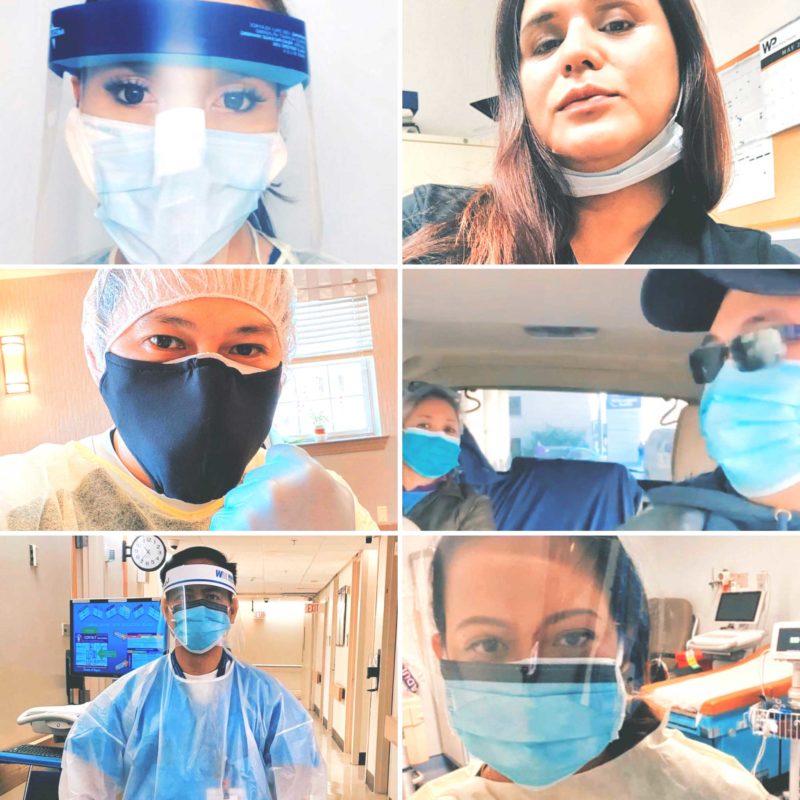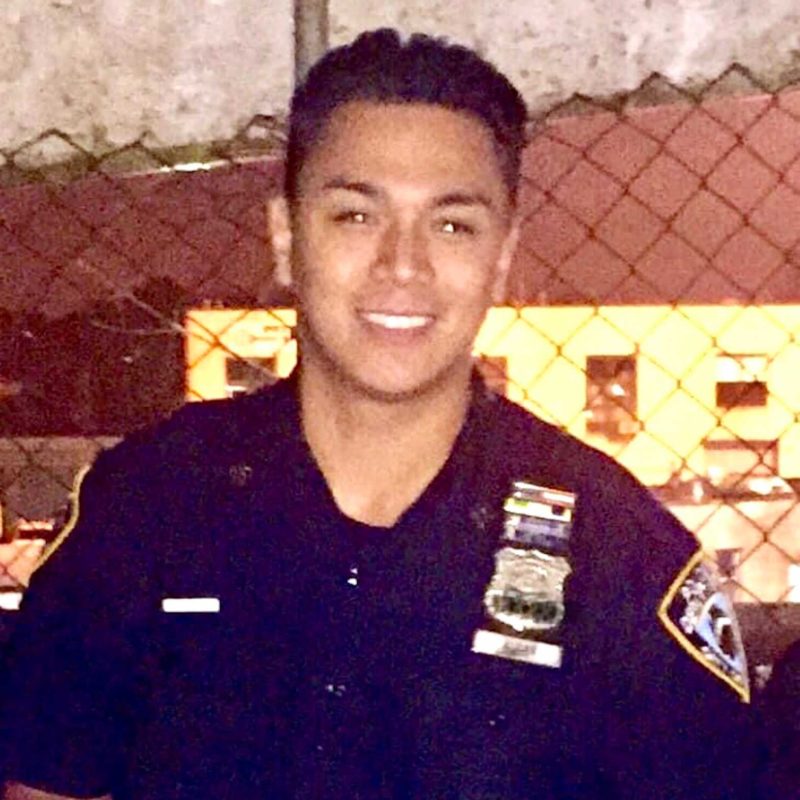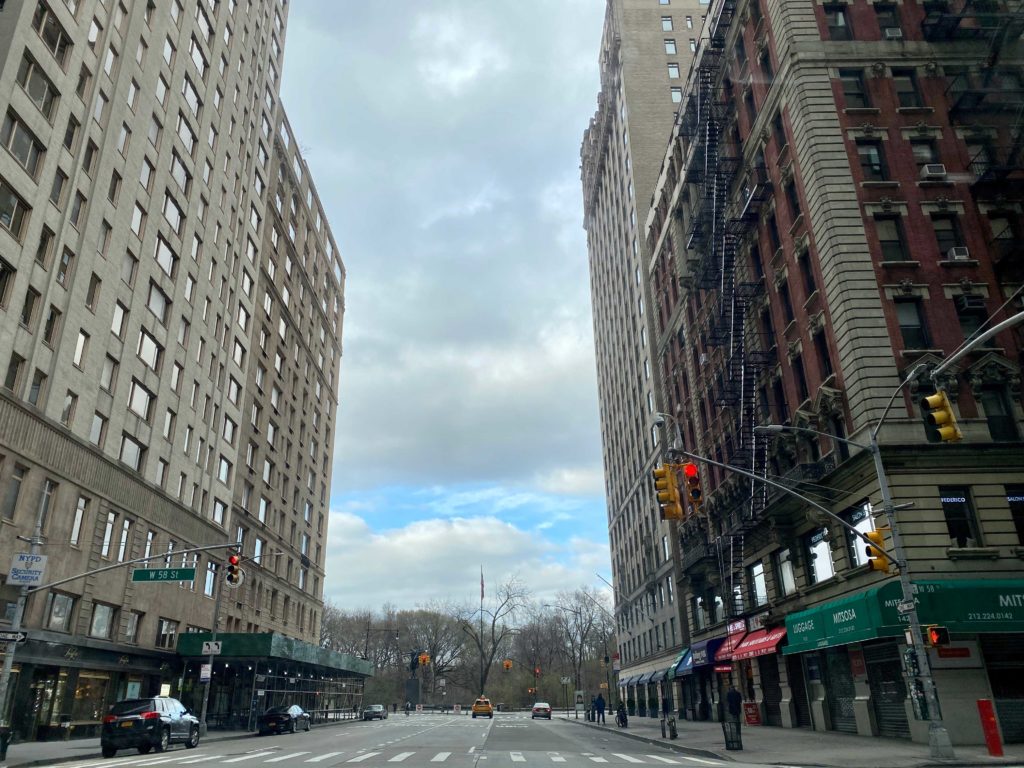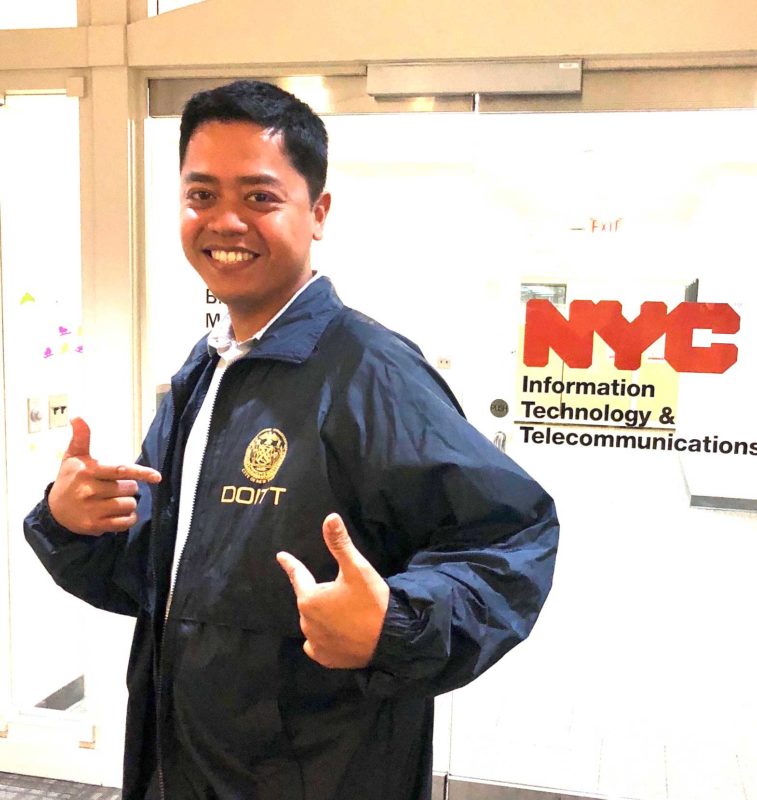Fil-Am front liners in fight vs. pandemic — is it worth dying for?

Fil-Am front liners in New York, the epicenter of the coronavirus disease in the U.S. These days, they are as much concerned about not getting sick so that they could continue to help save as many lives as possible. INQUIRER/Elton Lugay
NEW YORK—As New York braces for the inevitable apex of COVID-19 this week, everyone must spend another two weeks in home quarantine and wear masks when out and about while social distancing by at least six feet. For many, the combination of fear, anxiety and uncertainty is becoming unbearable by the day, more so for those on the front lines.
“Each day, I question myself, is it worth risking my life and my family’s safety?” says Michelle Pros, a staff nurse at Bellevue Hospital in Manhattan. “But this is the nature of my job. Nursing is my calling.”
Many of the nurses on the frontlines of this war are Filipino Americans. Risking their lives every time they report for work, there is a growing sense of foreboding. These days, they are as much concerned about not getting sick so that they could continue to help save as many lives as possible.
The coronavirus pandemic has to-date affected more than 1 million people worldwide, and New York is the epicenter of the disease in the United States, with the death toll fast surpassing that for 9/11.
“We are an army fighting an invisible enemy,” Dawn Saladores Coleman, a transgender nurse who moved last month from New York to Nashville, told INQUIRER.net. “I’m anxious, scared, but cautiously ready to face this enemy when it would finally hit home.”
Dealing with COVID-19 patients on a daily basis without proper personal protective equipment (PPE) is very concerning. “We get reports that some of our first responders get infected and die. This will continue if we don’t get the proper protection at work. It’s like going to war without armor,” Pros says.
Ventilators and PPE are getting scarce as the COVID-19 pandemic plagues the nation. Seemingly ever-changing official guidelines are also worrisome.

Police Officer Mellie Alban is exhorting fellow New Yorkers to do their part by staying home for now. “If people sacrificed their daily life for two to three weeks, we could get back to normal.” INQUIRER/Elton Lugay
“Though it’s nice that they’ve encouraged massive testing, the problem of shortages is preventing us from doing our job. You might be symptomatic with fever, cough or sore throat, but they would rule in sending you home and advise you to take paracetamol,” Pros says.
These days, inundated hospitals do not take in patients unless they are severely ill due to the higher risk of transmission, not to mention the shortage of beds. In the case of nurses, severity of symptoms is their only way out.
“We [health care workers] might be asymptomatic but unless we are severely deteriorating, we are still encouraged to work and be at the bedside,” explains Pros.
The federal government urges everyone to help flatten the curve but the risk of passing the virus on to others is high for people who are asymptomatic. “So the cycle never ends,” says Pros. “It’s really important to isolate yourself for 14 days.”

Empty streets of NYC look apocalyptic due to the COVID19 pandemic. Eight out of every 10 people wear masks and gloves, and it is quieter than usual in grocery stores. INQUIRER/Elton Lugay
Dr. Georgio Dano, a nurse practitioner from Staten Island who has tested positive for the virus, believes that health care workers will get the virus one way or another, so it is important for them to check daily.
“It’s horrible to get sick [with COVID-19],” Dano told INQUIRER.net. “You will be alone in the hospital. I’ve seen many patients calling their families from their hospital beds, bidding their final goodbyes.”
“It’s heartbreaking to see nurses and doctors crying as they come out of rooms saying it’s not looking good or it won’t be long,” he adds.
Despite a quick recovery, thanks to his good health and lack of any comorbidities, Dano remains worried about fellow fron liners. “Many health care workers and overseas Filipino workers work too many long hours and sacrifice their own health and [could] unfortunately lose the battle,” he says.
“I wear a mask not only at work, but most especially at home where I live with my mom and her husband who is already 75 years old,” Arianne Aldecoa, an operating room nurse, told INQUIRER.net. In the course of her work, she sometimes has to flit to critical respiratory units where a completely different set of nursing skills is required.
“We Filipino nurses are trained to be resilient and hardworking and in my unit, we are overwhelmed with COVID-19 patients daily, we are short-staffed,” Aldecoa reveals. “My heart crumbles seeing them come in with fever, cough, and labored breathing – knowing that in a few hours to come, they will be sedated and reliant on ventilators.”
Muted by social distancing
While reminiscent of 9/11, which claimed about 3,000 lives, this pandemic does not seem as scary to New Yorkers.
Amy Besa, owner of Purple Yam restaurant, still has vivid memories of the 9/11 terrorist attacks.
“Actually 9/11 was scarier because there were planes flying about that were acting as bombs and there were so many false reports of other hijacked planes that could crash anywhere. We were stuck in Brooklyn where I heard ambulance sirens going on all day. The day they restarted subways, we went to Manhattan and could not get off on our stop and had to go to 14th St. The smell of burning plastic and building parts – and humans too, we presumed – hit us hard. And that’s when the horrific nature of the moment hit me. It was also the sight of a clear landscape where the two towers stood that finally made me weep,” she told INQUIRER.net.
“That day, I felt I was an American. Being a New Yorker is nothing compared with realizing what America stood for people like me who fled martial law and sought refuge here. I love New York and will never feel comfortable anywhere else. But then I can imagine leaving it for retirement somewhere,” she adds.
Though the pandemic is horrifying, its impact is somehow muted by the social distancing. “The problem with the virus epidemic is that we cannot get comfort and healing by being physically close with our friends. Social distancing has made it difficult to grasp the gravity of this epidemic. I hope once this is over, we’ll realize how valuable our health and freedom are,” Besa says.
For Mellie Alban, an NYPD officer, the danger is all too real. “I have tons of friends on this job who tested positive already… [Yet] some people are not taking this seriously and continue to wander the streets with no regard for safety,” he told INQUIRER.net. “I feel like we gave our enemies a heads-up on how to defeat us. We just defeated ourselves by panicking and hoarding… We showed others that we aren’t prepared for a biochemical attack.”
A proud New Yorker, Alban noted that New York Gov. Andrew Cuomo “is doing everything to flatten the curve and making sure that previous lives are saved.” The NYPD officer is exhorting fellow New Yorkers to do their part by staying home for now. “If people sacrificed their daily life for two to three weeks, we could get back to normal.”
Singer and business owner Boston Dolina has no regrets being in NYC in the time of COVID-19. “There’s no place on earth we’d rather be than in New York now, more than ever. Everything ‘New York’ is what makes us stronger, better and mindful human beings,” he told INQUIRER.net.
“Yes, we are scared. We are worried for all the medical and essential workers on every level that’s out there every day saving lives. After 9/11, it’s almost in our subconscious as New Yorkers that we will be targeted again. But how do you prepare for something that’s invisible? And worst, it’s global. And yet again, we fight. We support each other. We pray. So God help us all. We are in this together,” Dolina says.

Sherwin Reyes, a senior information technology engineer ar the NYC Mayor’s Office, works to ensure the city’s connectivity. INQUIRER/Elton Lugay
Gavin Hormillosa, another NYPD officer, believes: “In order to be a New Yorker, you have to be tough. You’re not a New Yorker if you’re not tough and able to adapt to your surroundings.”
Sherwin Reyes, a senior information technology engineer at the NYC Mayor’s Office, thinks transparency is a big plus today because people can cultivate situational awareness. His job at the Mayor’s Office is to ensure the city’s connectivity.
“Although what lingers in my mind is my vulnerable infant, elderly family members, neighbors who are at risk or our health care workers, we value the life we are given and those who make us who we are. Our empathy will help us in the long run while we live here,” he told INQUIRER.net.
It’s the feeling of solidarity with fellow New Yorkers that lingers in times of crisis, according to Fil-Am community leader, businesswoman and philanthropist Loida Nicolas Lewis, who has been a New Yorker since 1969.
“We are all in this together. So I share with my friends the healthy protocol I know of breathing warm steam, taking virgin coconut oil, lots of Vitamin C and praying to God for mercy and good health. This too shall pass.”

